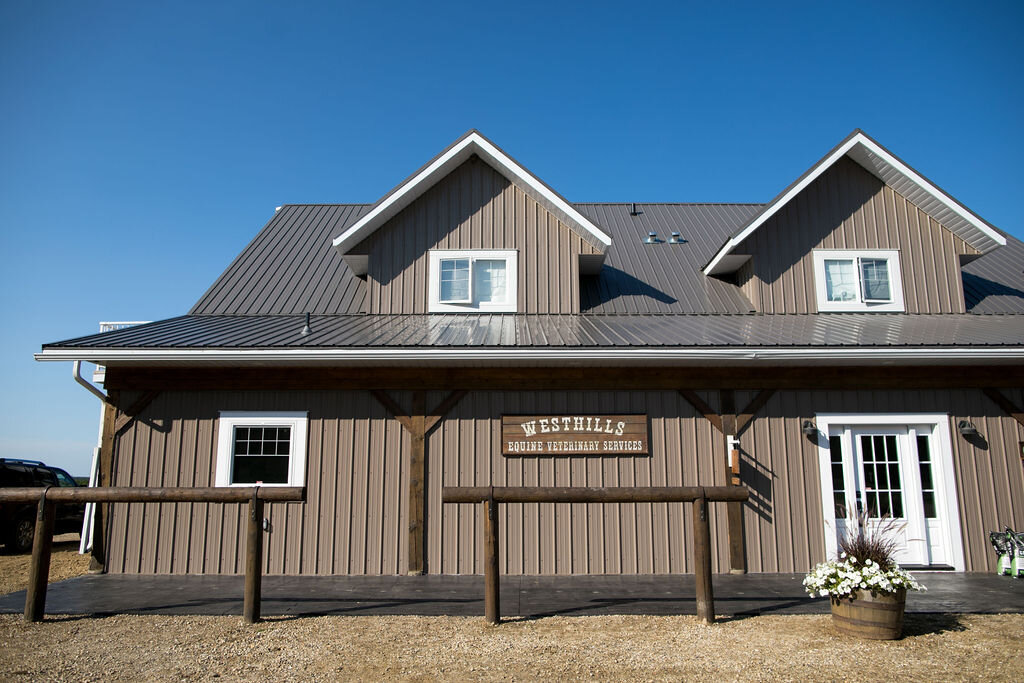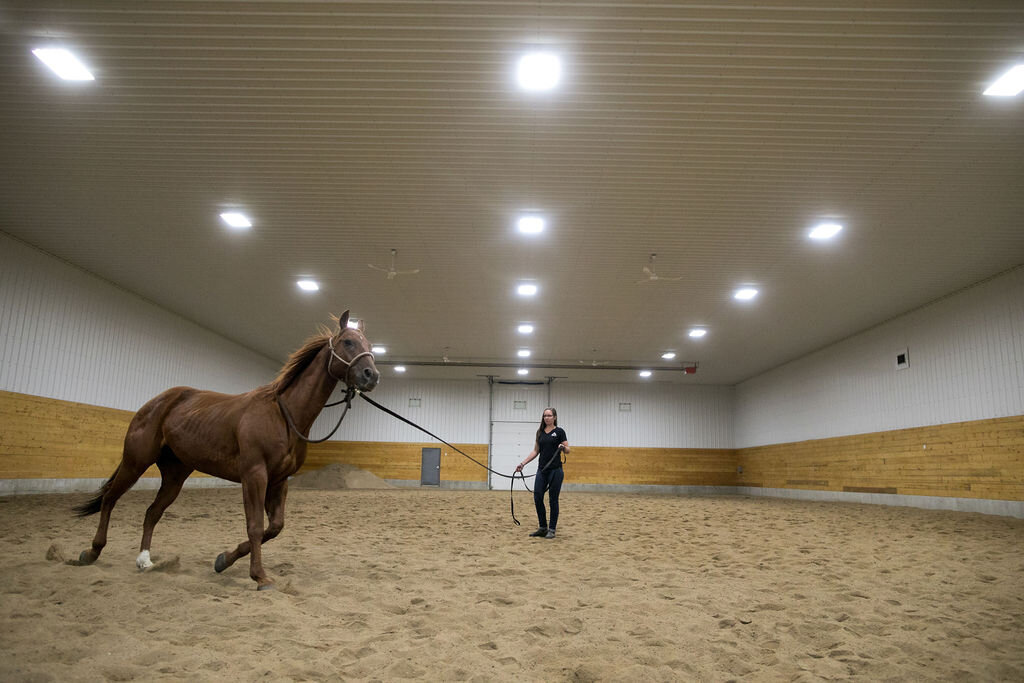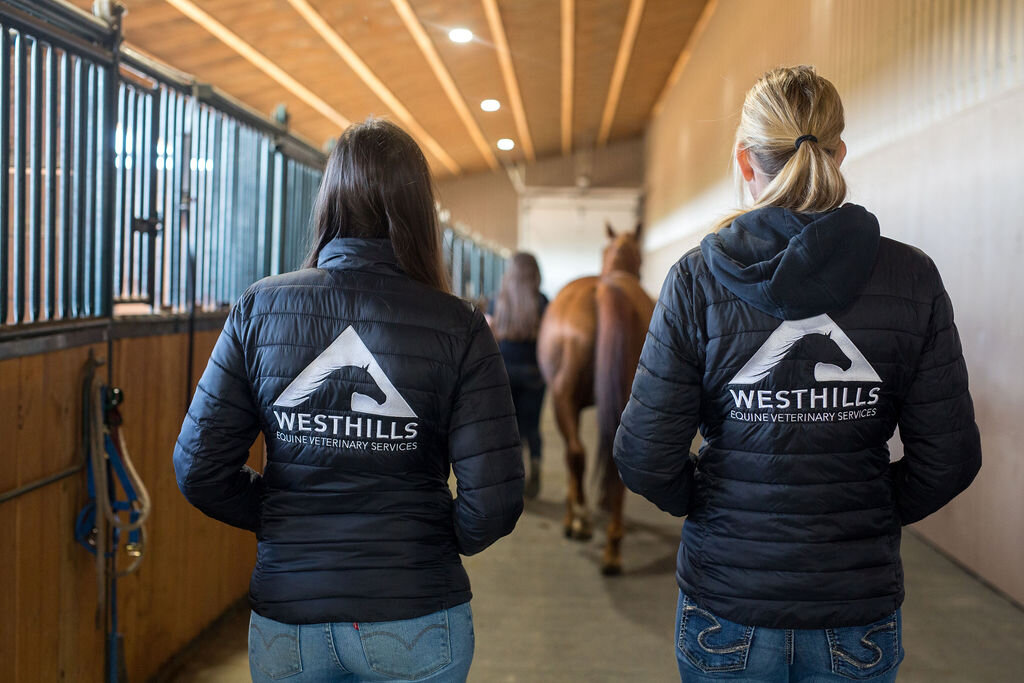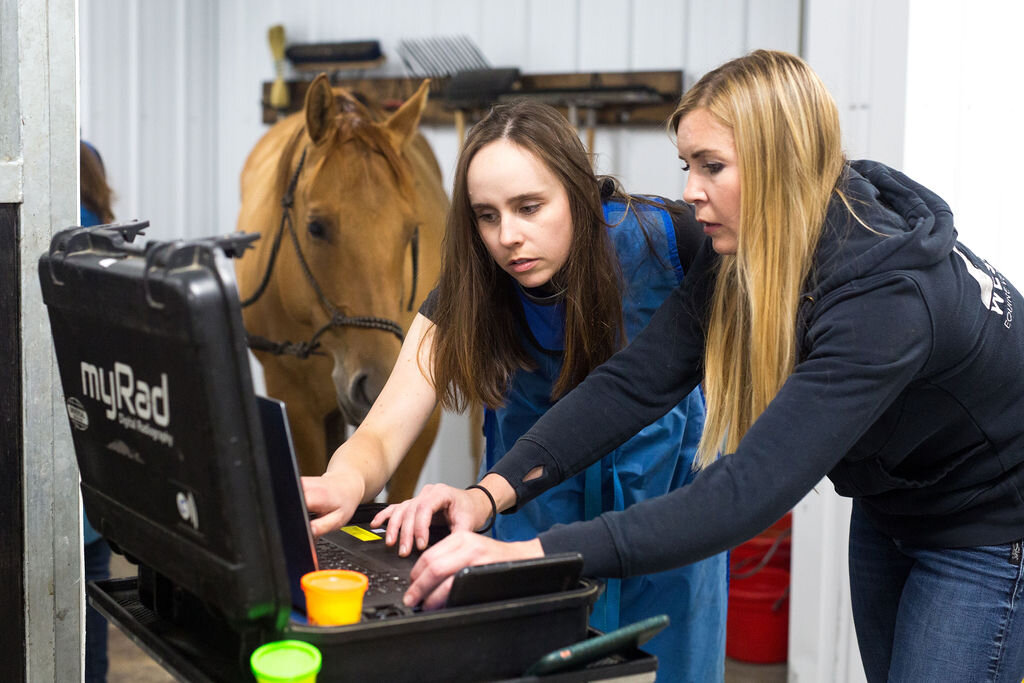Q&A with Dr. Sarah Malenchak, Veterinarian and Owner of Westhills Equine Veterinary Services
I met Sarah when we were 14 or 15 years old, and I joined the Fisher Branch Girls Hockey team in Manitoba. A few other girls and I would drive the 45-min from Arborg, the town where we were from to practice a couple of times a week. Since those early days, Sarah and I have remained close, we’ve grown up together both personally and professionally. I’ve watched her make decisions over the years that have accumulated into the successful business that she operates today–she has nearly doubled her staff in the past year. I wanted to dive into some of the choices she has made, what led her down the path of entrepreneurship and celebrate this long-time friend’s professional and personal achievements!
Tell me about yourself. What led to you practice equine veterinary?
I grew up on a beef and grain farm just outside Fisher Branch. I had always enjoyed participating in the farm activities that had to do with looking after the animals, but disliked fixing tractors and handing my dad tools (haha). I knew I wanted a future in agriculture but on the animal side, so I volunteered with a local veterinarian. I enjoyed that initial experience, we travelled around visiting different farms and every day was something different. From there I started researching veterinary schools and volunteering at a variety of clinics that dealt with small animals, cows and horses.
Today, I live on the same property our business is located on, near Stony Plain, AB with my partner Brent and our two little girls.
Where did you go to school? What is veterinary school like? Are internships and practice hours part of the curriculum? Can you describe the process? I started at the University of Manitoba and took a wide range of initial courses and almost went into Interior Design! From the UofM I completed the two years prerequisite required to apply to the Western College of Veterinary Medicine in Saskatoon. To get into that college there is an interview and application process.
The coursework includes lectures and a lot of labs. It is intense and the days are long. It feels like a lifetime ago now, but I don’t remember it being fun! The entire fourth year is spent doing all the required rotations in the teaching hospital such as large animal surgery, small animal medicine, radiology, etc. Fourth year allows you to practice all the technical skills in a teaching environment before entering practice. You are also able to do externships where you can travel to other clinics to get specialized experience.
After you graduate you can do an internship and a residency program if you choose to specialize. Internships aren’t required for general practice so technically you can go right to work after graduating. I chose to focus on horses, so all of my fourth-year rotations, externships and continuing education were focused on equine medicine.
When did you decide to start your own business? Describe the operation size, services and specialties?
When I moved to the area, I started working with a practice that was specialized in equine reproduction. I was the backup veterinarian for the practice and got experience with general equine practice requirements which included things like vaccines, floats, lameness, emergency medicine, etc. Since I was subcontracting for them, they recommended that I start a business for tax purposes so that is how Westhills came to be and after about a year, I started out on my own.
I started Westhills Equine Veterinary Services in 2011 as a mobile service. It was a challenge to get started as I couldn’t apply for a loan because of the amount of student debt I had, which meant I could only purchase things as I had the funds for them. Then it became part of my day-to-day, working towards purchasing the things as I had the funds so that I could continue to provide new kinds of services. From there I rented office space and hired a bookkeeper, then hired my first summer student, Emily who is still with me today. The business continued to grow as we found there was a demand for a practice because there was not a dedicated one that serviced horses in the area. In 2014, I bought a piece of land and built a home base office/hospital facility and from then we’ve just continued to improve our facility, add capabilities, introduce programs for students and hire more staff.
Today, we are a full-service equine care clinic specializing in reproduction (mare, stallion, foaling out and neonatal care). Our team has grown to 23 people and the majority of us are female, which is unique in our field and sets us apart.
You have an internship and externship program, how do they work?
The internship program was developed last year and we currently have our first intern working for us! It is a program for recent graduates that are looking for mentorship to develop confidence, technical skills, decision-making abilities and exceptional client communication, all things required to excel in their role as a veterinarian.
Our externship program is similar, but for students that are still enrolled in school. It is a 2–6-week period that they take in their fourth-year rotations that helps them develop skills and decide if they want to do an internship at our practice.
If you’re interested, you can learn more about it on our website here!
Tell me about your Influential Athlete Program?
Early this year I was nominated for the Women of Influence award through the Greater Parkland Regional Chamber. The campaign encourages individual growth, creativity, and leadership among diverse groups of women. This nomination inspired our team to explore how we could give back to the community that has supported us all these years. So, we developed the Influential Athlete Program to recognize athletes in Parkland County and the surrounding areas that are doing good for both the equine industry and the community. Despite the diversity that exists throughout equine sport, from pleasure riders to international competitors of varying disciplines, the staple that unites us all is our undeniable passion for the horse. We strongly believe that quality horsemanship through positive influences in the equine community is key to uniting all equestrian athletes in respect to every level of the sport. Our credence in this program derives from the fact that the qualities that often deem someone a great horseman/woman, can also represent them as a great member of the community.
The program offers support in a variety of ways to help the athlete reach their goals, from veterinary support to help with show fees. The applications we have been receiving are phenomenal, it’s been such a great program and we are so glad we started it.
How did COVID affect your business?
The area we found the most challenging with COVID is continuing appropriate communication with our clients, so we’ve really been focusing on the efficiency of communication. We introduced a new phone system so that we can text and send/receive pictures from our clients that are not directly in front of us. We introduced a phone consult appointment for clients that required assistance but cannot get their horse into us. We also had to hire more people to get things done, because clients could not come into the clinic anymore. It wasn’t an easy time for us, but I do value that it put the emphasis on communication and now we have the technology and systems in place that we will continue to use in the future.
How do you balance family life with a busy practice?
I sure don’t do a good job of it, haha. But I do try to involve our kids in what Brent and I are doing, my daughters love horses and watching treatments or me helping horses. But I really can’t call it balance, it’s more of a lifestyle. I wouldn’t change it for anything and hope that we are teaching our girls a strong work ethic and to work hard for their dreams. And I’m also not sure I was raised with balance, farm life is 24/7, so I don’t know anything different, it all just melds into one for me.
What were your biggest learnings? What were the biggest challenges?
The biggest learning is managing employees and general staff management. The first staff members I had overworked right along with me, but I’m learning that everyone works differently, requires different things and some people really need that balance or divide from their work life and home life. Understanding those differences and the impacts of that has been a huge lesson for me.
The biggest challenge is creating time for family and friends. I’ve come to terms with the fact that our work is very seasonal, summer is much more hectic, and I tend to get a bit of a break in winter. But even then, it is hard to completely take myself away from the business, even for a few days! So I would say time “off the clock” is a big challenge for me.
What’s something you wish you knew before starting your own business?
Nothing really, it all just happened for a reason the way it did. I don’t focus on the past and don’t believe you can prepare for everything. I tend to plan for what I can and take the rest as it comes.
You’ve more than doubled your staff this year, what brought about that large increase?
Our reproduction department grew immensely. A practice close to ours closed their reproduction department and we took over the clients and hired another veterinarian. That instantly doubled the amount of clients coming in during our busiest season. The increase in clients also called for an increase in support staff to keep everything running smoothly.
How do people find you? Where do you get most of your clients?
Social media has been huge as we’ve focused more on it over the years, our Facebook and Instagram pages are very active. Saying that, recommendations and referrals are still where we get most of our new business.
What qualities do you value most in your team, customers and vendors?
Dedication and loyalty are two big ones for our clients, we are grateful to have so many great ones. For our staff, I really appreciate that they strive to do the best for each patient - we all share a passion for horses and the patients we see.
What’s on your bookshelf?
My Audible book right now is “How to Talk to Little Kids So They Will Listen”. My girls are 1 and 3 years old right now, haha.
What do you do for fun?
Ride with my family, we all enjoy going for family rides!
What does the future hold for Westhills?
I’m at a crossroads. Do we continue to grow the business with things like a satellite program and a larger emergency care hospital, or do we optimize where we are at after a year of such massive growth? No matter what, I will always strive for Westhills and its staff to hold quality and ethical equine medicine in the highest regard, and continue to pursue opportunities as they come.
Currently, there is a small percentage of graduates that want to do equine medicine and not many of those that do are in rural locations like ours. It is a high-stress job and you don’t get much balance - as I mentioned before. It’s hard for me to see things within our industry that we can do better and not want to fix them, like create a more balanced and enjoyable lifestyle for veterinarians in rural practice. So, I do believe something needs to change with the business model, but time will tell if we want to tackle the challenge!
Like everything else in my life, I will probably just take it as it comes.
Where can we find you?
Website - https://www.westhillsevs.com/
Instagram - https://www.instagram.com/westhillsequine/
Facebook - https://www.facebook.com/westhillsequine






